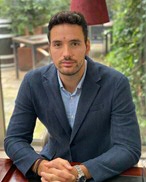NWO-M grant for sustainable ammonia production

Dr. Vassilis Kyriakou of the Faculty of Science and Engineering (RUG) has received an ENW-M grant from the Netherlands Organization for Scientific Research (NWO). He will receive EUR 400,000 to develop an innovative electrochemical reactor for sustainable ammonia production.
The ENW M grant allows researchers to develop creative, high-risk ideas and bring about scientific innovations in all disciplines of the Exact and Natural Sciences.
Solution to power supply problem
Ammonia is an important chemical product for the fertilizer industry and is also a promising carbon-free energy carrier. However, it is a very energy-intensive chemical feedstock, responsible for 1-2% of energy consumption and CO2 emissions worldwide. Kyriakou's project focuses on developing an innovative electrochemical reactor that combines all steps of hydrogen production and purification from water electrolysis and ammonia synthesis in a single device. This approach, which uses green ammonia as an alternative carrier of energy, could, among other things, provide a solution to the current problem of varying power supply.
Read more
Twenty-one innovative research projects awarded through Open Competition Domain Science-M programme
More news
-
17 February 2026
The long search for new physics
-
10 February 2026
Why only a small number of planets are suitable for life
